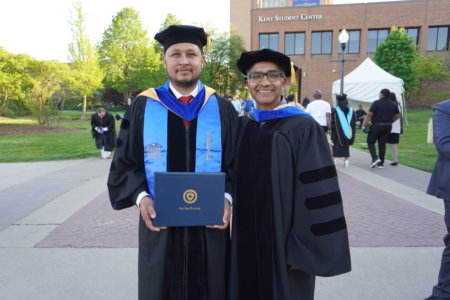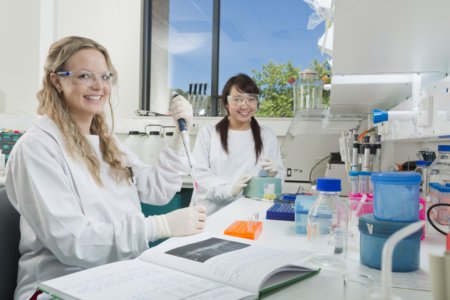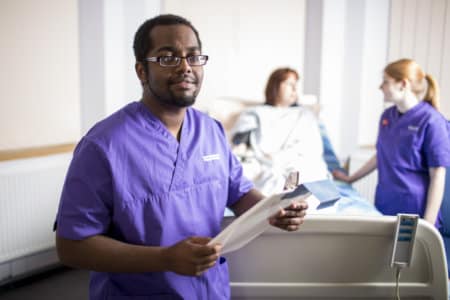
The US is at the forefront of medical research. The nation carries out 46% of global R&D in life sciences, according to UNESCO data. From understanding Alzheimer’s disease to advancing cancer immunotherapy, researchers here are rapidly transforming the landscape of health science. The healthcare services and technology (HST), in particular, is thriving, driven by demand for data, analytics, and software.
It’s an entire ecosystem that embraces innovation – where better to get inspired to make your contribution to this field? American universities are home to some of the best minds and advanced graduate degrees in health science. These are our three top picks:

UNLV is one of the most diverse universities in the US. Source: University of Nevada, Las Vegas
University of Nevada, Las Vegas
Forward-looking engineers, scientists, educators, health professionals, artists, policymakers, and entrepreneurs all launch their careers from the University of Nevada, Las Vegas (UNLV) — a Carnegie R1 institution nationally recognised for high-impact research and community-driven innovation.
Nowhere is this spirit more evident than in the Doctor of Philosophy – Interdisciplinary Health Sciences programme. As one of the first programmes of its kind in the Western US, it brings together experts from Biomechanics, Exercise Physiology, Nutrition Sciences, Health Physics, Medical Physics, Motor Control/Learning, and Rehabilitation Sciences. Together, they deliver a boundary-breaking approach to health science research. This empowers students to tackle real-world healthcare challenges through rigorous scientific inquiry, interdisciplinary collaboration, and translational impact.
For those drawn to radiation therapy physics and radiation safety, UNLV’s Health Physics programme offers the perfect blend of theory and hands-on training. At both undergraduate and postgraduate levels, students on this route explore the science of radiation protection and radiation therapy through two advanced tracks: Environmental Health Physics and Medical Physics — the latter of which also offers a dedicated PhD pathway for aspiring researchers ready to push the limits of medical innovation.
This level of breadth explains why UNLV stands out as one of America’s most diverse campuses, ranked in the top five nationally for student diversity. With a diversity index of 0.76 out of 1, the university celebrates its global community, including a growing international student population with over 1,000 international undergraduate and graduate students. To prepare them to thrive and lead in an interconnected world, the UNLV offers inclusive events, cultural programmes, and dedicated support.
Find out more about applying to the University of Nevada, Las Vegas now.

Although known for nursing, the College of Nursing and Health Innovation is growing and continuing to add more programmes. Source: The University of Texas at Arlington/Facebook
The University of Texas at Arlington
The College of Nursing and Health Innovation at the University of Texas at Arlington is where excellence in basic and applied health science education and research happens. It’s home to places like the Bone Vascular and Microcirculation Laboratory which examines the interaction between blood vessels and bone and the Nicotine and Tobacco Research Laboratory which finds the effects of tobacco products on health.
Join the PhD in Nursing and you’ll get be part of this interdisciplinary environment with world-class resources. Here, aspiring future nurse scientists can learn and grow with full support at every step of the way. Your advisors aren’t only improving human health outcomes and nursing practice human health outcomes and nursing practice. They’re doing this with students collaboratively.
UTA CONHI takes many other ways to ensure students are successful. A Research Mentor, generally drawn from the ollege’s active research faculty, and supervisory committee will guide you throughout the curriculum, coursework and dissertation. This includes helping you out with your research agenda as well as finding opportunities to enhance your learning outside UTA.
Meanwhile, the committee gives additional oversight to your program of study and research. As you pass through coursework to diagnostic examination, from dissertation proposal and doctoral candidacy to dissertation defence, faculty are invited to guide your scholarly work. With their support, you’re set to conduct highly innovative research, lead healthcare organizations, teach at the college level, author books, and work for government agencies to lead research and help define policies as a graduate.

MD degree students at NYU Grossman School of Medicine are offered a Full-Tuition Scholarship. Source: NYU Grossman School of Medicine/Facebook
New York University
The pioneer of the first three-year medical degree programme, New York University‘s Grossman School of Medicine, is pushing more boundaries in medical education and research. By training future physicians, conducting important medical research, and caring for patients, the school has made discoveries that have contributed to improving the health of people around the world ever since it opened in 1841. The first vaccine for polio was invented here.
You can follow in their path towards greatness when studying at the 13th-best medicine school in the US.
It all starts at the Vilcek Institute of Graduate Biomedical Sciences, which offers master’s and PhD programmes that emphasise research work. Take the MS in Biomedical Informatics, for example. Here, you will learn to create novel computational and quantitative methods and apply them to biomedical research. With help from award-winning faculty and an in-house high-performance computing facility, you will sharpen your practical skills to prepare you for a career either in academic research, the pharmaceutical or biotechnology industry, medical centres, hospitals, and insurance and consulting companies.
Another is the MS in Genome Health Analysis, which trains you to use genomic data to provide concise and practical advice for patients. Here, you will develop skills in data science to identify functional variants, calculate health risks, and propose evidence-based management options to mitigate those risks. The PhD programme, on the other hand, is flexible and can be personalised to your research interests. You can focus on topics such as mechanisms of diseases, quantitative biology, neuroscience & physiology, and more that fall under the biomedical science umbrella.
*Some of the institutions featured in this article are commercial partners of Study International










